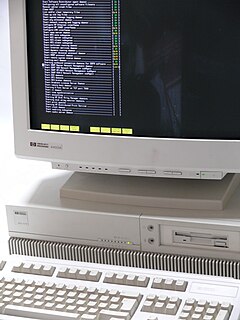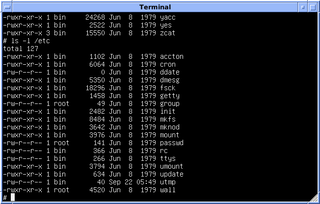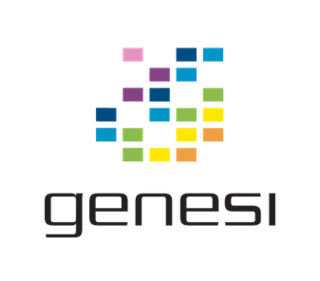
PowerPC is a reduced instruction set computer (RISC) instruction set architecture (ISA) created by the 1991 Apple–IBM–Motorola alliance, known as AIM. PowerPC, as an evolving instruction set, has since 2006 been named Power ISA, while the old name lives on as a trademark for some implementations of Power Architecture–based processors.

Solaris is a proprietary Unix operating system originally developed by Sun Microsystems. After the Sun acquisition by Oracle in 2010, it was renamed Oracle Solaris.
A computing platform or digital platform is an environment in which a piece of software is executed. It may be the hardware or the operating system (OS), even a web browser and associated application programming interfaces, or other underlying software, as long as the program code is executed with it. Computing platforms have different abstraction levels, including a computer architecture, an OS, or runtime libraries. A computing platform is the stage on which computer programs can run.

Portage is a package management system originally created for and used by Gentoo Linux and also by Chrome OS, Calculate, Sabayon, and Funtoo Linux among others. Portage is based on the concept of ports collections. Gentoo is sometimes referred to as a meta-distribution due to the extreme flexibility of Portage, which makes it operating-system-independent. The Gentoo/Alt project is concerned with using Portage to manage other operating systems, such as BSDs, macOS and Solaris. The most notable of these implementations is the Gentoo/FreeBSD project.

Pegasos is a MicroATX motherboard powered by a PowerPC 750CXe or PowerPC 7447 microprocessor, featuring three PCI slots, one AGP slot, two Ethernet ports, USB, DDR, AC'97 sound, and FireWire. Like the PowerPC Macintosh counterparts, it boots via Open Firmware.
MkLinux is an open-source software computer operating system begun by the Open Software Foundation Research Institute and Apple Computer in February 1996, to port Linux to the PowerPC platform, and Macintosh computers. The name refers to the Linux kernel being adapted to run as a server hosted on the Mach microkernel, version 3.0.
CodeWarrior is an integrated development environment (IDE) published by NXP Semiconductors for editing, compiling, and debugging software for several microcontrollers and microprocessors and digital signal controllers used in embedded systems.

Unix System V is one of the first commercial versions of the Unix operating system. It was originally developed by AT&T and first released in 1983. Four major versions of System V were released, numbered 1, 2, 3, and 4. System V Release 4 (SVR4) was commercially the most successful version, being the result of an effort, marketed as Unix System Unification, which solicited the collaboration of the major Unix vendors. It was the source of several common commercial Unix features. System V is sometimes abbreviated to SysV.

This is a list of operating systems specifically focused on security. Operating systems for general-purpose usage may be secure without having a specific focus on security.
These tables provide a comparison of operating systems, of computer devices, as listing general and technical information for a number of widely used and currently available PC or handheld operating systems. The article "Usage share of operating systems" provides a broader, and more general, comparison of operating systems that includes servers, mainframes and supercomputers.

In Unix-based computer operating systems, init is the first process started during booting of the computer system. Init is a daemon process that continues running until the system is shut down. It is the direct or indirect ancestor of all other processes and automatically adopts all orphaned processes. Init is started by the kernel during the booting process; a kernel panic will occur if the kernel is unable to start it. Init is typically assigned process identifier 1.
QuickTransit is a cross-platform virtualization program developed by Transitive Corporation. It allows software compiled for one specific processor and operating system combination to be executed on a different processor and/or operating system architecture without source code or binary changes.

Metrowerks was a company that developed software development tools for various desktop, handheld, embedded, and gaming platforms. Its flagship product, CodeWarrior, comprised an IDE, compilers, linkers, debuggers, libraries, and related tools. In 1999 it was acquired by Motorola and in 2005 it was spun-off as part of Freescale, which continues to sell these tools. In 2015, Freescale Semiconductor was absorbed into NXP.

The Open Desktop Workstation, also referred to as ODW is a PowerPC based computer, by San Antonio-based Genesi. The ODW has an interchangeable CPU card allowing for a wide range of PowerPC microprocessors from IBM and Freescale Semiconductor.

Genesi is an international group of technology and consulting companies in the United States, Mexico and Germany. It is most widely known for designing and manufacturing ARM architecture and Power ISA-based computing devices. The Genesi Group consists of Genesi USA Inc., Genesi Americas LLC, Genesi Europe UG, Red Efika, bPlan GmbH and the affiliated non-profit organization Power2People.

Efika is a line of power efficient ARM architecture and Power ISA based computers manufactured by Genesi.









